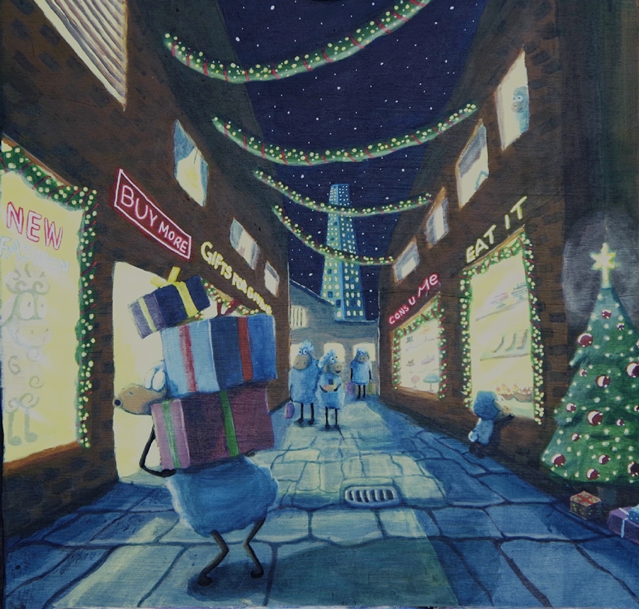Definition:
“Christmas shopping” refers to the practice of purchasing gifts, Christmas decorations, and festive supplies in preparation for the Christmas holiday. This activity typically takes place during the weeks leading up to Christmas and is characterized by a surge in retail sales and consumer spending.
Etymology:
The term “Christmas” comes from Old English “Cristes mæsse,” meaning “Christ’s Mass.” “Shopping” derives from the Old French “eschoppe,” meaning a booth or market stall, combined with the English suffix “-ing” to denote the activity of purchasing goods.
Description:
Christmas gift shopping can be a particularly stressful activity because society often places high demands on giving gifts to loved ones to demonstrate care and generosity. For many, this means they have to work extra hard to earn the money, or they have to get by with very little themselves, to afford the gifts. As it is said that giving gifts demonstrates care and generosity, many will assume that people don’t care about them if they don’t receive gifts. At the same time, it is traditional for everyone to shop for Christmas gifts during the same period, instead of spreading the shopping throughout the year, which means that shopping centers are filled with extremely stressed people during the Christmas season. For very few people, it is important that the gifts are something the recipient actually needs, so a vast number of the gifts people buy for each other are completely unnecessary items that generally never get used.
Christmas shopping practices can vary around the world:
- In the United States and Canada, the Christmas shopping season traditionally kicks off with Black Friday, the day after Thanksgiving, known for significant sales and discounts. Cyber Monday, the following Monday, is another major shopping day focused on online sales.
- In the United Kingdom, Christmas shopping often begins in early November, with a focus on high street shopping and festive markets. Boxing Day sales on December 26th are also significant.
- In Germany, Christmas markets (Weihnachtsmärkte) are popular destinations for holiday shopping, offering handmade gifts, ornaments, and festive foods.
- In Australia, Christmas shopping coincides with the summer season, featuring outdoor markets and beach-themed gifts.
- In Japan, while Christmas is not a traditional holiday, it is celebrated with a focus on gift-giving and festive decorations, often influenced by Western customs.
Symbolism:
Christmas gift giving is intended to reflect the spirit of giving and sharing. It is true that there is a significant group of people who engage in charity work for those most in need. However, the vast majority of Christmas gift giving reflects people’s tendency to favor a few over the many.
Religion:
Despite Christmas being a Christian holiday, excessive Christmas shopping is actually discouraged in Christianity. This is yet another example of how Christians are not always good at adhering to their own religion.
The Catholic Church encourages the faithful to focus on the spiritual aspects of Christmas, such as attending Mass, participating in Advent activities, and reflecting on the birth of Jesus Christ. Pope Francis has frequently spoken against consumerism, especially during Christmas. He encourages the faithful to focus on the spiritual and familial aspects of the holiday rather than material goods. While gift-giving is seen as a way to express love and generosity, it should not overshadow the true meaning of Christmas.
Many Protestant denominations emphasize the importance of moderation and the spirit of giving, especially to those in need. They encourage believers to avoid excessive consumerism and to remember the less fortunate during the holiday season. Protestant leaders often highlight the importance of avoiding the commercialization of Christmas. They encourage believers to focus on the spiritual meaning of the holiday and to practice generosity in a way that aligns with Christian values.
Orthodox Christians also stress the importance of the Nativity Fast leading up to Christmas, which is a time for spiritual reflection, prayer, and fasting. The focus is on the religious significance of Christ’s birth rather than material gift-giving.
